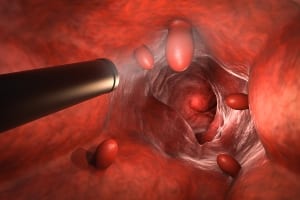 The treatment of intestinal polyps in Israel is carried out by the experts of the Gastroenterology Department at “Herzliya Medical Center” private hospital.
The treatment of intestinal polyps in Israel is carried out by the experts of the Gastroenterology Department at “Herzliya Medical Center” private hospital.
The diagnosis and treatment of many diseases of the gastrointestinal tract are conducted with the use of high-tech endoscopic techniques. Specialists at “Herzliya Medical Center” have extensive experience in endoscopic procedures on the large intestine, guaranteeing a superior quality execution with minimal risk of complications.
Polyps of the colon
Polyps of the colon are small clumps of cells on the inner surface of different parts of the colon. Benign polyps are characterized by a high degree of cell differentiation, as well as slow and non-invasive growth. There are single or multiple polyps. The disease is characterized by long asymptomatic initial stages. Some types of polyps are prone to turn into malignant transformation, which explains the importance of their timely diagnosis and treatment.
Varieties of colon polyps
There are several types of colon polyps, including:
- Hyperplastic polyp – occurs as an isolated form or in the form of hyperplastic polyposis. This kind of polyps is not prone to malignant transformation
- Adenomatous polyp develops from the glands of the intestinal mucosa. There is a correlation between the duration of the disease and the probability of cancerous transformation. Two-thirds of all polyps are adenomatous, nearly all malignant polyps are adenomatous.
- Villous and villous adenoma tubular-like adenomatous polyps increase the risk of colon cancer
Inflammatory polyps occur with chronic inflammation of the mucosa and submucosa. This species is characterized by the clinical symptoms of the inflammatory process. The presence of cellular dysplasia increases the risk of developing a malignant tumor at the site of the chronic inflammation - Hereditary polyposis syndromes. The probability of malignant transformation of polyps in carriers of a genetic mutation that cause hereditary polyposis maybe 100%.
Symptoms of intestinal polyps
As mentioned above, polyps usually cause no symptoms but people can experience the following signs:
- Abdominal pain, cramps
- Rectal bleeding
- Nausea and vomiting
- Stool appear black
- Diarrhea or constipation
- A sense of tiredness (due to loss of blood)
If you experience the above symptoms, go see a doctor, especially if you are over the age of fifty, or if you have a family history.
Diagnosis of intestinal polyps in Israel
In the Department of Gastroenterology at “Herzliya Medical Center” modern methods of diagnosing colon polyps in Israel are conducted, such as:
- Colonoscopy – an endoscopic method for studying the intestine, using fiber-optic technology. The method allows not only to diagnose diseases of the colon but also for diagnostic biopsy, as well as the complete removal of small suspicious lesions
- Sigmoidoscopy – a kind of colonoscopy exploring limited areas of the large intestine (rectum and sigmoid)
- Barium enema – the X-ray method, allowing to determine the filling defects of the colon after administration of contrast medium
- Computed tomography of the method of virtual colonoscopy. This non-invasive research allows to precisely determine the pathological processes of the large intestine. The main disadvantage of this method is the inability to obtain samples for further histological examination
- Laboratory studies of the level of tumor markers, and fecal occult blood
- Genetic tests for hereditary syndromes and chromosomal mutations
Treatment of intestinal polyps in Israel
Diagnosed sporadic polyps are generally removed during a colonoscopy. The removal is painless for the patient. A histological analysis identifies the need for additional research and treatment, the physician can conduct a biopsy as well during colonoscopy. Laboratory research in this case not only determines the type of tumor but also gives an indication of the presence of malignant cells. The involvement of the border area requires further surgery to avoid the spread of cancer.
The treatment of hereditary polyposis in Israel is based on scientific studies that determine the likelihood of developing cancer in carriers of a certain type of genetic mutation. High, and in some cases 100% probability of cancer, necessitates the recommendation of prophylactic removal of the affected area of the colon. This preventive intervention significantly reduces the likelihood of developing cancer and has no significant effect on the quality of life for patients.
The staff of the Division of Gastroenterology at HMC is constantly developing the professional level of technology and endoscopic studies, improving their accuracy and diagnostic value. The use of innovative methods of laboratory research makes maximum accuracy possible to establish a definitive diagnosis and choose the most effective treatment for intestinal polyps and the prevention of malignant transformation.
 Patients Log In
Patients Log In 










